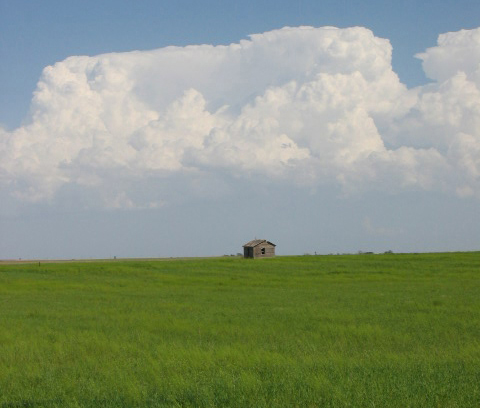Nothing Says Love Like a Storm Shelter
I bought Pam a storm shelter for Valentine's Day this year. My original plan was for a nice white apron (she loves to cook) with a little red heart embroidered in the approximate location of her own heart, but I opted out of that choice as similar gifts in the past have caused her to "tear-up" and, frankly, the episodes have begun to get to me a little bit in my agedness.
I'm pretty sensitive myself, and have never enjoyed watching grown people cry. So, the storm shelter.
When the truck arrived with her romantic little concrete cubicle, she was surprised. She wanted to know what the truck was for. I told her not for a dozen red roses, but for something really special, and outlined the nature of her gift.
She was stunned speechless, and went outside and unfolded a lawn chair under the carport and watched the installation of a gift that will likely endure at least as long as the Great Pyramid of Cheops, such is the strength of my love for this little girl from Wewoka. She spoke not a word for nearly an hour, about the length of time of installation, and then she said, "You never cease to amaze me," and went into the house, and started crying again, anyway.
It's hard to keep one's spouse of nearly fifty years interested mainly in you. You have to work at it a little. In my case, and in nearly all others I know anything about, the effort has been rewarded.
Pam was the first one interested in heading down into the shelter the other day when the storms down in OKC headed our way. Many of us in this state grew up with storm shelters uppermost in our minds: She did, I did. Did you?
It's practically a mark of eligibility for native status. If you have to have the term "fraidy hole" explained to you, you're an outlander, and come immediately under suspicion for all sorts of other nefarious inclinations.
Pam knows fraidy holes. Many a warm night spent visiting her grandmother down yonder in Sasakwa she had been rounded up along with everyone else in the house and marched under ground into the root cellar, dirt floor, spiders and toads all around; stacks and stacks of pickled beets, green beans; unbagged, homegrown potatoes, and jeweled jars of chow-chow to outwait what Granny Rhoades knew to be certain, swirling death, the same that everyone knew to be just that in her neighborhood.
It was an unquestioned fact: Dark clouds meant death coming at you on a highspeed rail. It's arrival even sounded like a train.
Drive rural Oklahoma to this day, and you can still see the old root cellars couched quietly behind homes old, and new, far from the madding cities and their plastic, changing cultures. You wonder, sometimes, do strangers to the country understand the totality of their mute message: Lives were saved here, others changed eternally.
Because of my mother and father's involvement in WWll, I was largely raised by my Great Grandmother, and her daughter until I was four years old, just southeast of Wapanucka, Oklahoma. Those women, and Grandpa Austin, took me fishing in nearby Clear Boggy River often.
All fishing, hunting, all everyday work, was dictated by the weather in that country, in fact all over the state before the advent of TV in the 1950's. There were no hourly weather reports, no doppler radar, or minute-to-minute updates with onsite, live video of tornadoes on the ground and headed your way. People looked after themselves, and trusted their own meteorological judgement, which was considerable for all its primitiveness.
I remember one day long ago in that far country working in a garden with Great Grandma "Lizzie" (I used to tell friends that my great grandmother was Elizabeth Taylor, and it was true). I was maybe eight or nine years old, and I wanted to go fishing in the Clear boggy more than I wanted to work in a garden, and said so.
"Not today, sonny," she said, leaning on her hoe and looking up at the sky. "Most likely we'll all be in the cellar by dark-thirty. See them clouds? Them's "dominicker" clouds. Bad weather comin' ."

Grandma Lizzie? Well she was working another garden in some other far away place, and undoubtedly already knew what we had to wait for a TV man to tell us. By news time, Pam had already gathered up a flashlight and a few other things, and had us all headed for her Valentine's Day present.
Lots of things
more important than fishing. Valentine's day might be one; Grandmothers,
another.
©
2013 Conrad M. Vollertsen




Love your stories and can just see you both in my mind!
ReplyDelete